Item 1: Report to Shareholders
 |
| Reserve Investment Funds | November 30, 2007 |
The views and opinions in this report were current as of November 30, 2007. They are not guarantees of performance or investment results and should not be taken as investment advice. Investment decisions reflect a variety of factors, and the managers reserve the right to change their views about individual stocks, sectors, and the markets at any time. As a result, the views expressed should not be relied upon as a forecast of the fund’s future investment intent. The report is certified under the Sarbanes-Oxley Act, which requires mutual funds and other public companies to affirm that, to the best of their knowledge, the information in their financial reports is fairly and accurately stated in all material respects.
REPORTS ON THE WEB
Sign up for our E-mail Program, and you can begin to receive updated fund reports and prospectuses online rather than through the mail. Log in to your account at troweprice.com for more information.
| FUND EXPENSE EXAMPLE |
As a mutual fund shareholder, you may incur two types of costs: (1) transaction costs, such as redemption fees or sales loads, and (2) ongoing costs, including management fees, distribution and service (12b-1) fees, and other fund expenses. The following example is intended to help you understand your ongoing costs (in dollars) of investing in the fund and to compare these costs with the ongoing costs of investing in other mutual funds. The example is based on an investment of $1,000 invested at the beginning of the most recent six-month period and held for the entire period.
Actual Expenses
The first line of the following table (“Actual”) provides information about actual account values and expenses based on the fund’s actual returns. You may use the information in this line, together with your account balance, to estimate the expenses that you paid over the period. Simply divide your account value by $1,000 (for example, an $8,600 account value divided by $1,000 = 8.6), then multiply the result by the number in the first line under the heading “Expenses Paid During Period” to estimate the expenses you paid on your account during this period.
Hypothetical Example for Comparison Purposes
The information on the second line of the table (“Hypothetical”) is based on hypothetical account values and expenses derived from the fund’s actual expense ratio and an assumed 5% per year rate of return before expenses (not the fund’s actual return). You may compare the ongoing costs of investing in the fund with other funds by contrasting this 5% hypothetical example and the 5% hypothetical examples that appear in the shareholder reports of the other funds. The hypothetical account values and expenses may not be used to estimate the actual ending account balance or expenses you paid for the period.
Note: T. Rowe Price charges an annual small-account maintenance fee of $10, generally for accounts with less than $2,000 ($500 for UGMA/UTMA). The fee is waived for any investor whose T. Rowe Price mutual fund accounts total $25,000 or more, accounts employing automatic investing, and IRAs and other retirement plan accounts that utilize a prototype plan sponsored by T. Rowe Price (although a separate custodial or administrative fee may apply to such accounts). This fee is not included in the accompanying table. If you are subject to the fee, keep it in mind when you are estimating the ongoing expenses of investing in the fund and when comparing the expenses of this fund with other funds.
You should also be aware that the expenses shown in the table highlight only your ongoing costs and do not reflect any transaction costs, such as redemption fees or sales loads. Therefore, the second line of the table is useful in comparing ongoing costs only and will not help you determine the relative total costs of owning different funds. To the extent a fund charges transaction costs, however, the total cost of owning that fund is higher.

T. ROWE PRICE RESERVE INVESTMENT FUND
Unaudited
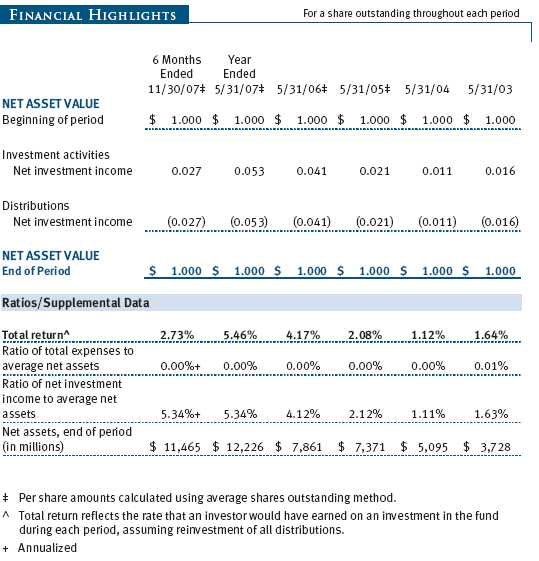
The accompanying notes are an integral part of these financial statements.
T. ROWE PRICE GOVERNMENT RESERVE INVESTMENT FUND
Unaudited
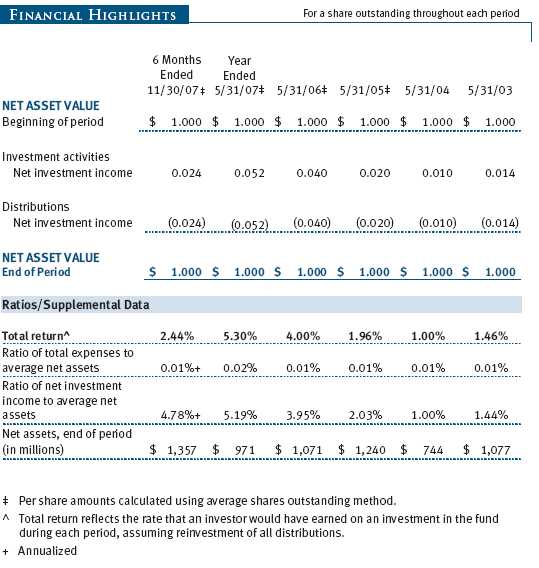
The accompanying notes are an integral part of these financial statements.
T. ROWE PRICE RESERVE INVESTMENT FUND
Unaudited
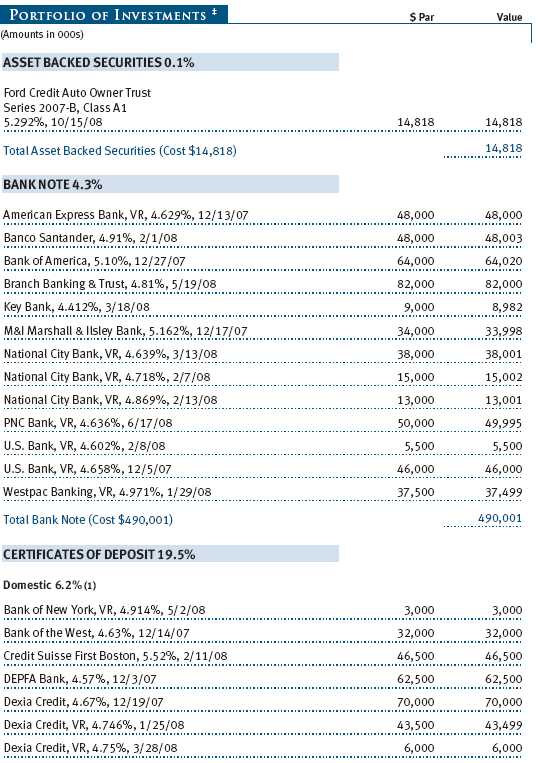

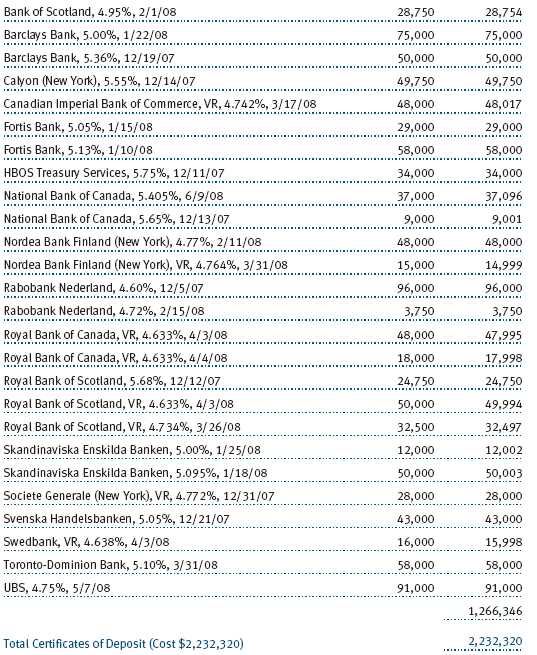

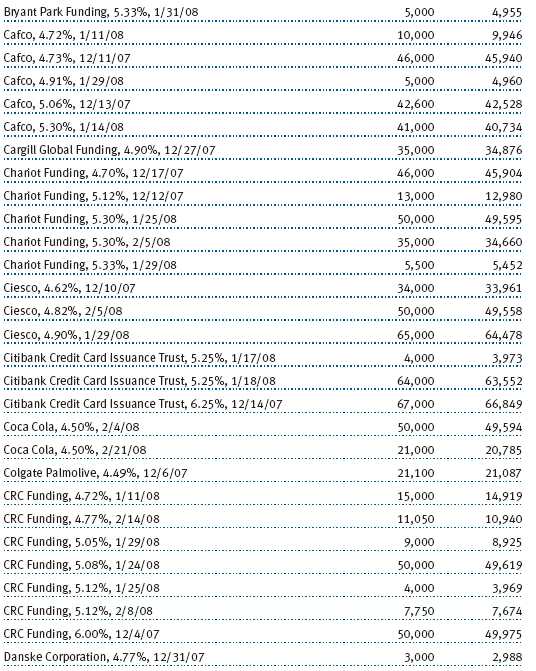
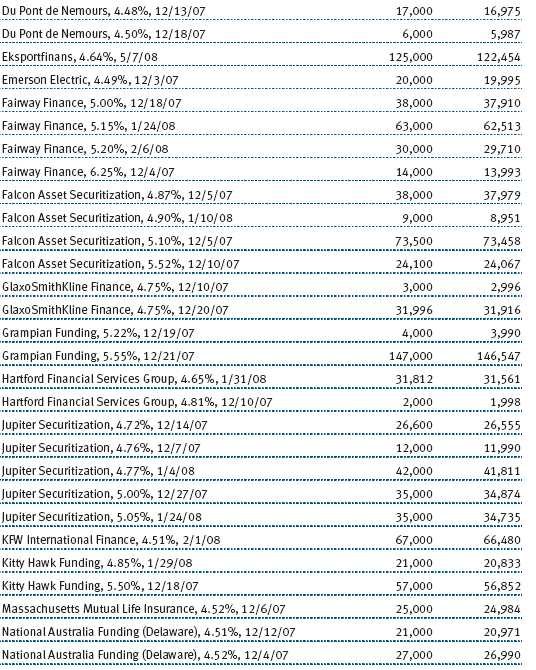
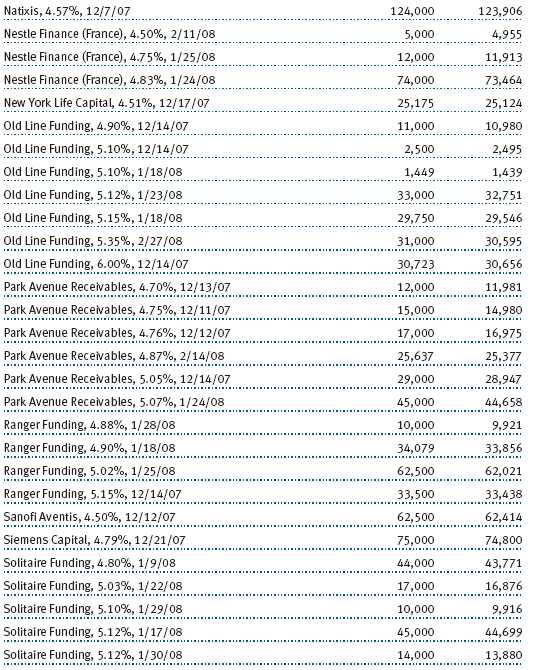



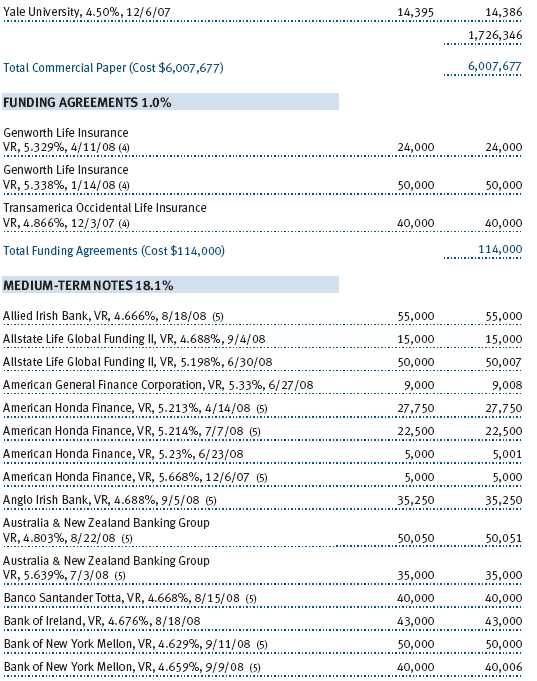
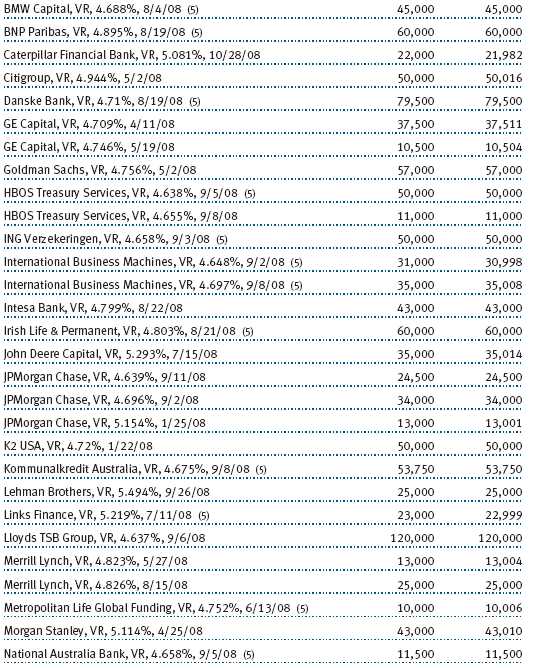

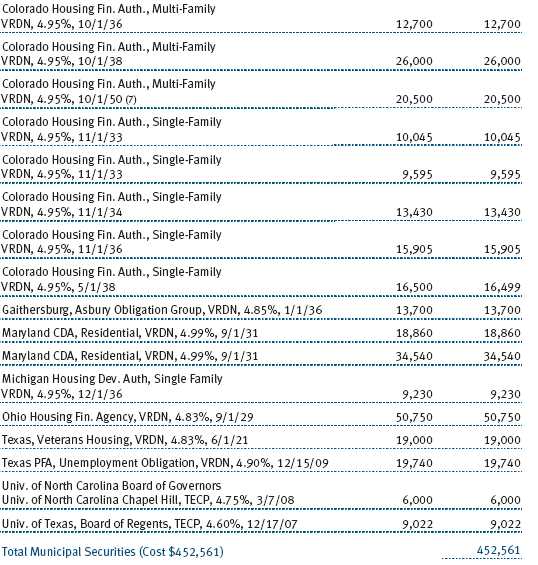

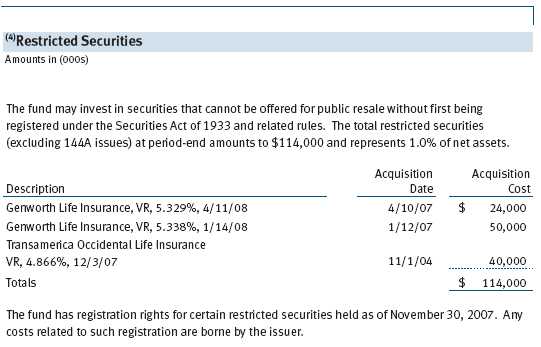
The accompanying notes are an integral part of these financial statements.
T. ROWE PRICE GOVERNMENT RESERVE INVESTMENT FUND
Unaudited

The accompanying notes are an integral part of these financial statements.
T. ROWE PRICE RESERVE INVESTMENT FUND
Unaudited
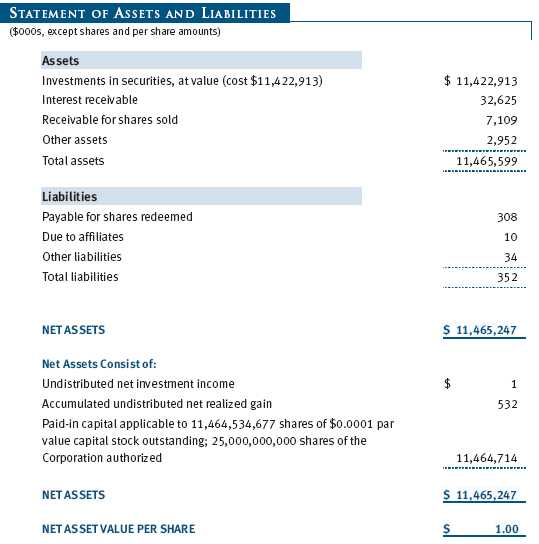
The accompanying notes are an integral part of these financial statements.
T. ROWE PRICE GOVERNMENT RESERVE INVESTMENT FUND
Unaudited

The accompanying notes are an integral part of these financial statements.
T. ROWE PRICE RESERVE INVESTMENT FUND
Unaudited
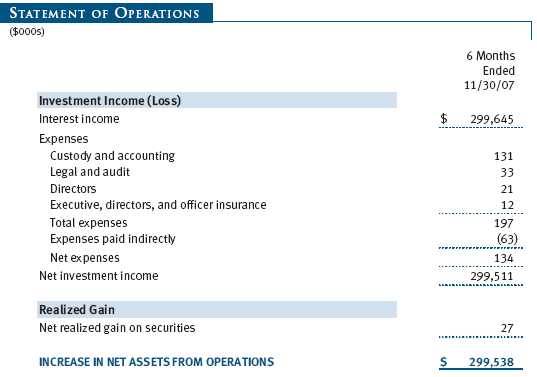
The accompanying notes are an integral part of these financial statements.
T. ROWE PRICE GOVERNMENT RESERVE INVESTMENT FUND
Unaudited

The accompanying notes are an integral part of these financial statements.
T. ROWE PRICE RESERVE INVESTMENT FUND
Unaudited

The accompanying notes are an integral part of these financial statements.
T. ROWE PRICE GOVERNMENT RESERVE INVESTMENT FUND
Unaudited

The accompanying notes are an integral part of these financial statements.
Unaudited
| NOTES TO FINANCIAL STATEMENTS |
T. Rowe Price Reserve Investment Funds, Inc. (the corporation), is registered under the Investment Company Act of 1940 (the Act), as a diversified, open-end management investment company. T. Rowe Price Reserve Investment Fund and T. Rowe Price Government Reserve Investment Fund are two portfolios (collectively, the T. Rowe Price Reserve Investment Funds) established by the corporation and both commenced operations on August 25, 1997.
The T. Rowe Price Reserve Investment Funds are offered as cash management options to mutual funds, trusts, and other accounts managed by T. Rowe Price Associates (Price Associates), and/or its affiliates, and are not available for direct purchase by members of the public. The T. Rowe Price Reserve Investment Funds seek preservation of capital, liquidity, and, consistent with these goals, the highest possible current income.
NOTE 1 - SIGNIFICANT ACCOUNTING POLICIES
Basis of Preparation The accompanying financial statements were prepared in accordance with accounting principles generally accepted in the United States of America, which require the use of estimates made by fund management. Fund management believes that estimates and security valuations are appropriate; however, actual results may differ from those estimates, and the security valuations reflected in the financial statements may differ from the value the fund ultimately realizes upon sale of the securities.
Valuation Each fund values its investments and computes its net asset value per share at the close of the New York Stock Exchange (NYSE), normally 4 p.m. ET, each day that the NYSE is open for business. Securities are valued at amortized cost. Investments for which such valuation procedures are inappropriate or deemed not to reflect fair value are stated at fair value as determined in good faith by the T. Rowe Price Valuation Committee, established by the funds’ Board of Directors.
Credits The funds earn credits on temporarily uninvested cash balances at the custodian that reduce the funds’ custody charges. Custody expense in the accompanying financial statements is presented before reduction for credits, which are reflected as expenses paid indirectly.
Other Income and expenses are recorded on the accrual basis. Premiums and discounts on debt securities are amortized for financial reporting purposes. Income tax-related interest and penalties, if incurred, would be recorded as income tax expense. Investment transactions are accounted for on the trade date. Realized gains and losses are reported on the identified cost basis. Distributions to shareholders are recorded on the ex-dividend date.
New Accounting Pronouncements Effective November 30, 2007, T. Rowe Price Reserve Investment Funds adopted Financial Accounting Standards Board (FASB) Interpretation No. 48 (FIN 48), Accounting for Uncertainty in Income Taxes, a clarification of FASB Statement No. 109, Accounting for Income Taxes. FIN 48 establishes financial accounting and disclosure requirements for recognition and measurement of tax positions taken or expected to be taken on an income tax return. The adoption of FIN 48 had no impact on the net assets or results of operations of the T. Rowe Price Reserve Investment Funds.
In September 2006, the FASB released the Statement of Financial Accounting Standard No.157 (FAS 157), Fair Value Measurements. FAS 157 clarifies the definition of fair value and establishes the framework for measuring fair value, as well as proper disclosure of this methodology in the financial statements. It will be effective for the funds’ fiscal years beginning June 1, 2008. Management is evaluating the effects of FAS 157; however, it is not expected to have a material impact on the net assets or results of operations of the T. Rowe Price Reserve Investment Funds.
NOTE 2 - INVESTMENT TRANSACTIONS
Consistent with each fund’s investment objective, the funds engage in the following practices to manage exposure to certain risks or to enhance performance. The investment objective, policies, program and risk factors of the funds are described more fully in the funds’ prospectus and Statement of Additional Information.
Repurchase Agreements All repurchase agreements are fully collateralized by U.S. government securities. Collateral is in the possession of the funds’ custodian or, for tri-party agreements, the custodian designated by the agreement. Collateral is evaluated daily to ensure that its market value exceeds the delivery value of the repurchase agreements at maturity. Although risk is mitigated by the collateral, the funds could experience a delay in recovering its value and a possible loss of income or value if the counterparty fails to perform in accordance with the terms of the agreement.
Restricted Securities The funds may invest in securities that are subject to legal or contractual restrictions on resale. Although certain of these securities may be readily sold, for example, under Rule 144A, others may be illiquid, their sale may involve substantial delays and additional costs, and prompt sale at an acceptable price may be difficult.
NOTE 3 - FEDERAL INCOME TAXES
No provision for federal income taxes is required since each fund intends to continue to qualify as a regulated investment company under Subchapter M of the Internal Revenue Code and distribute to shareholders all of its taxable income and gains. Federal income tax regulations differ from generally accepted accounting principles; therefore, distributions determined in accordance with tax regulations may differ in amount or character from net investment income and realized gains for financial reporting purposes. Financial reporting records are adjusted for permanent book/tax differences to reflect tax character. Financial records are not adjusted for temporary differences. The amount and character of tax-basis distributions and composition of net assets are finalized at fiscal year-end; accordingly, tax-basis balances have not been determined as of November 30, 2007.
The funds intend to retain realized gains to the extent of available capital loss carryforwards. As of May 31, 2007, the T. Rowe Price Reserve Investment Fund had $35,000 of unused capital loss carryforwards that expire in fiscal 2013, $13,000 that expire in fiscal 2014, and $13,000 that expire in fiscal 2015. As of May 31, 2007, the T. Rowe Price Government Reserve Investment Fund had $14,000 of capital loss carryforwards that expire in fiscal 2013.
At November 30, 2007, the cost of investments for federal income tax purposes was $11,422,913,000 and $1,356,594,000 for the T. Rowe Price Reserve Investment Fund and the T. Rowe Price Government Reserve Investment Fund, respectively.
NOTE 4 - RELATED PARTIES
Price Associates is a wholly owned subsidiary of T. Rowe Price Group and is the investment manager for the T. Rowe Price Reserve Investment Fund and T. Rowe Price Government Reserve Investment Fund. Price Associates or T. Rowe Price International, Inc. (Price International), a wholly owned subsidiary of Price Associates, also provides investment management services to all shareholders of the T. Rowe Price Reserve Investment Funds. The T. Rowe Price Reserve Investment Funds pay no management fees; however, Price Associates or Price International receives management fees from the mutual funds and other accounts invested in the T. Rowe Price Reserve Investment Fund and T. Rowe Price Government Reserve Investment Fund. Certain officers and directors of the T. Rowe Price Reserve Investment Fund and T. Rowe Price Government Reserve Investment Fund are also officers and directors of Price Associates and its subsidiaries, and of those invested in the T. Rowe Price Reserve Investment Funds.
Pursuant to various service agreements, Price Associates and its wholly owned subsidiaries provide shareholder and administrative, transfer and dividend disbursing, accounting, and certain other services to the T. Rowe Price Reserve Investment Funds. For the six months ended November 30, 2007, expenses incurred by the T. Rowe Price Reserve Investment Fund pursuant to these service agreements were $61,000 for Price Associates. The amount payable at period-end pursuant to these agreements is included in Due to Affiliates in the accompanying financial statements. For the six months ended November 30, 2007, expenses incurred by the T. Rowe Price Government Reserve Investment Fund pursuant to these service agreements were $47,000 for Price Associates. The amount payable at period-end pursuant to these agreements is included in Due to Affiliates in the accompanying financial statements.
NOTE 5 - INTERFUND BORROWING PROGRAM
Price Associates has developed a program that provides temporary liquidity under an interfund borrowing agreement between T. Rowe Price Reserve Investment Fund and other T. Rowe Price-sponsored mutual funds and permits the borrowing and lending of cash at rates beneficial to both the borrowing and lending funds. Pursuant to program guidelines, the T. Rowe Price Reserve Investment Fund may lend up to 15% of its net assets, of which no more than 5% of its net assets may be lent to any one borrower. Loans totaling 10% or more of a borrowing fund’s total assets are collateralized at 102% of the value of the loan; loans of less than 10% are unsecured. During the six months ended November 30, 2007, the T. Rowe Price Reserve Investment Fund made loans to other funds on 76 days, in the average amount of $12,011,000, and at an average annual rate of 5.11%. At November 30, 2007, there were no loans outstanding.
| INFORMATION ON PROXY VOTING POLICIES, PROCEDURES, AND RECORDS |
A description of the policies and procedures used by T. Rowe Price funds and portfolios to determine how to vote proxies relating to portfolio securities is available in each fund’s Statement of Additional Information, which you may request by calling 1-800-225-5132 or by accessing the SEC’s Web site, www.sec.gov. The description of our proxy voting policies and procedures is also available on our Web site, www.troweprice.com. To access it, click on the words “Company Info” at the top of our homepage for individual investors. Then, in the window that appears, click on the “Proxy Voting Policy” navigation button in the top left corner.
Each fund’s most recent annual proxy voting record is available on our Web site and through the SEC’s Web site. To access it through our Web site, follow the directions above, then click on the words “Proxy Voting Record” at the bottom of the Proxy Voting Policy page.
| HOW TO OBTAIN QUARTERLY PORTFOLIO HOLDINGS |
The fund files a complete schedule of portfolio holdings with the Securities and Exchange Commission for the first and third quarters of each fiscal year on Form N-Q. The fund’s Form N-Q is available electronically on the SEC’s Web site (www.sec.gov); hard copies may be reviewed and copied at the SEC’s Public Reference Room, 450 Fifth St. N.W., Washington, DC 20549. For more information on the Public Reference Room, call 1-800-SEC-0330.
Item 2. Code of Ethics.
A code of ethics, as defined in Item 2 of Form N-CSR, applicable to its principal executive officer, principal financial officer, principal accounting officer or controller, or persons performing similar functions is filed as an exhibit to the registrant’s annual Form N-CSR. No substantive amendments were approved or waivers were granted to this code of ethics during the registrant’s most recent fiscal half-year.
Item 3. Audit Committee Financial Expert.
Disclosure required in registrant’s annual Form N-CSR.
Item 4. Principal Accountant Fees and Services.
Disclosure required in registrant’s annual Form N-CSR.
Item 5. Audit Committee of Listed Registrants.
Not applicable.
Item 6. Schedule of Investments.
Not applicable. The complete schedule of investments is included in Item 1 of this Form N-CSR.
Item 7. Disclosure of Proxy Voting Policies and Procedures for Closed-End Management Investment Companies.
Not applicable.
Item 8. Portfolio Managers of Closed-End Management Investment Companies.
Not applicable.
Item 9. Purchases of Equity Securities by Closed-End Management Investment Company and Affiliated Purchasers.
Not applicable.
Item 10. Submission of Matters to a Vote of Security Holders.
Not applicable.
Item 11. Controls and Procedures.
(a) The registrant’s principal executive officer and principal financial officer have evaluated the registrant’s disclosure controls and procedures within 90 days of this filing and have concluded that the registrant’s disclosure controls and procedures were effective, as of that date, in ensuring that information required to be disclosed by the registrant in this Form N-CSR was recorded, processed, summarized, and reported timely.
(b) The registrant’s principal executive officer and principal financial officer are aware of no change in the registrant’s internal control over financial reporting that occurred during the registrant’s second fiscal quarter covered by this report that has materially affected, or is reasonably likely to materially affect, the registrant’s internal control over financial reporting.
Item 12. Exhibits.(a)(1) The registrant’s code of ethics pursuant to Item 2 of Form N-CSR is filed with the registrant’s annual Form N-CSR.
(2) Separate certifications by the registrant's principal executive officer and principal financial officer, pursuant to Section 302 of the Sarbanes-Oxley Act of 2002 and required by Rule 30a-2(a) under the Investment Company Act of 1940, are attached.
(3) Written solicitation to repurchase securities issued by closed-end companies: not applicable.
(b) A certification by the registrant's principal executive officer and principal financial officer, pursuant to Section 906 of the Sarbanes-Oxley Act of 2002 and required by Rule 30a-2(b) under the Investment Company Act of 1940, is attached.
SIGNATURES | |
| Pursuant to the requirements of the Securities Exchange Act of 1934 and the Investment | |
| Company Act of 1940, the registrant has duly caused this report to be signed on its behalf by the | |
| undersigned, thereunto duly authorized. | |
| T. Rowe Price Reserve Investment Funds, Inc. | |
| By | /s/ Edward C. Bernard |
| Edward C. Bernard | |
| Principal Executive Officer | |
| Date | January 16, 2008 |
| Pursuant to the requirements of the Securities Exchange Act of 1934 and the Investment | |
| Company Act of 1940, this report has been signed below by the following persons on behalf of | |
| the registrant and in the capacities and on the dates indicated. | |
| By | /s/ Edward C. Bernard |
| Edward C. Bernard | |
| Principal Executive Officer | |
| Date | January 16, 2008 |
| By | /s/ Joseph A. Carrier |
| Joseph A. Carrier | |
| Principal Financial Officer | |
| Date | January 16, 2008 |